The Music of John Lewis
In 2013, when the Jazz at Lincoln Center Orchestra with Wynton Marsalis set out to celebrate the esteemed pianist and composer, they teamed up with then rising star Jon Batiste. The bandleader of The Late Show with Stephen Colbert and a prodigious pianist in his own right, Batiste joined the Jazz at Lincoln Center Orchestra to tackle some of Lewis’s most iconic tunes during a sold-out concert in Rose Theater, the House of Swing.
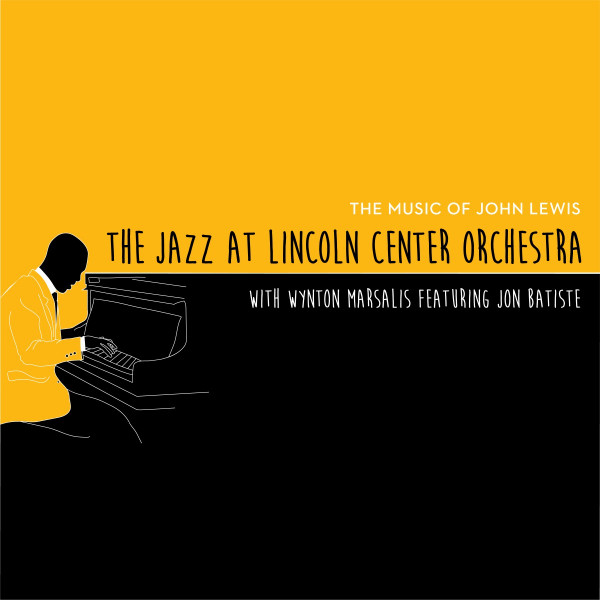
Album Info
| Ensemble | JLCO with Wynton Marsalis featuring Jon Batiste |
|---|---|
| Release Date | March 24th, 2017 |
| Recording Date | January 19, 2013 |
| Record Label | Blue Engine Records |
| Catalogue Number | BE0008 |
| Formats | CD, Digital Download |
| Genre | Jazz at Lincoln Center Recordings |
| Digital Booklet | Download (pdf, 4 MB) |
Track Listing
| Track | Length | Preview |
|---|---|---|
| 2 Degrees East, 3 Degrees West | 7:08 | Play |
| Animal Dance | 3:55 | Play |
| Django | 4:52 | Play |
| Jon Batiste Introduces the Band | 1:03 | Play |
| Delaunay’s Dilemma | 5:03 | Play |
| La Cantatrice (from The Comedy) | 5:08 | Play |
| Piazza Navona (from The Comedy) | 6:35 | Play |
| Pulcinella (from The Comedy) | 4:07 | Play |
| Spanish Steps (from The Comedy) | 4:49 | Play |
| Wynton Marsalis Discusses John Lewis | 1:40 | Play |
| Two Bass Hit | 6:45 | Play |
Liner Notes
In 2013, I presented the music of John Lewis in a series of concerts with the Jazz at Lincoln Center Orchestra in the House of Swing. Because Mr. Lewis’s work has been a huge influence on my aesthetic philosophy and multi-faceted approach to jazz, I wanted to construct a program that showcased his innovative piano style and highlighted his exceptional compositional skills. This was a daunting task.
John Lewis is undoubtedly a seminal figure in jazz history. To join this venerable federation of musicians, one must clearly be born with an innate musical talent. But that natural ability must be matched or surpassed with the militaristic discipline to develop the technical skills to play an instrument with a recognizable sound, the distinct rhythmic feeling required for deep swing, the ability to hear intention and communicate emotional intensity, and the intellectual curiosity to enrich your playing with an historical perspective. A select few have been able to climb this artistic Mount Everest and still possess the energy and wherewithal to become prolific composers and bandleaders. These musicians are a special breed.
John Lewis is a part of that extraction. His canon is an important chapter in the chronicles of pianist-composer-bandleaders that began with Jelly Roll Morton down in my hometown of New Orleans, and was most perfectly embodied by the great Duke Ellington. Though Ellington was his greatest influence, Mr. Lewis’s musical vision was singular, blending aspects of European classical music with the aesthetic values of the blues and a swinging beat. Blessed to be born in the era of jazz giants, he learned (in real time) the values of jazz from its chief practitioners, quickly becoming a young master and soon forging his own ingenious path for younger musicians on their own quests to scale this musical summit.
As music director of the Modern Jazz Quartet, his genius was clearly evidenced. During a time when most jazz groups were focused on the charisma of individual soloists, Mr. Lewis created a collective conception that incorporated the fundamentals of jazz in a most sophisticated manner. This uncommon approach, as well as their elegant dress and presentation, garnered quite a bit of opposition, but John Lewis responded with music. He was not a flamboyant, flashy player, choosing instead to display virtuosity with the gravitas and clarity of his sound and the thematic consistency and cogency of his solos. The same can be said of his composing and arranging styles. He was all music, all the time.
One of the most well-read and erudite of all jazz musicians, John Lewis’s worldview was just as richly informed as his musical conception. As only a true master can do, he often borrowed from other idioms and influences outside of jazz, illuminating their essence and originality while artfully enhancing his own creations. His use of counterpoint and the cameo appearances of classical rondos and fugues testify to this skill and insight.
In presenting this music with the Jazz at Lincoln Center Orchestra with Wynton Marsalis, I wanted to create a varied and comprehensive view of Mr. Lewis’s artistry. Though much of the music chosen for these 2013 concerts displays his unique ability to assimilate a diversity of influences into his sound, I wanted the music to be accessible to the novice and also insightful to the connoisseur. The compositions performed here include works for jazz orchestra, small group, and solo piano. They feature an array of grooves and various compositional techniques, yet, as was his way, they always return to jazz’s Old Faithful: a swinging rhythm section playing the blues in 4/4.
The set includes “Django,” an austere solo piano piece composed in tribute to the late French gypsy guitarist Django Reinhardt, as well as compositions that feature smaller configurations and display Mr. Lewis’s approach to the two most foundational forms in our idiom: “Delaunay’s Dilemma,” based on the chord changes of Gershwin’s “I Got Rhythm,” and “2 Degrees East, 3 Degrees West,” a 12-bar blues. Wynton Marsalis and the more-than-capable members of the JLCO took the stage as an ensemble for the remainder of this set. Together, we were intent upon swinging with intelligence, accuracy, and soul.
Small group and big band playing pose different challenges for pianists. In small groups, we generally create all of the harmonies and melodies that accompany soloists. But in a big band, we must intimately understand the nuances of each arrangement in order to perform our standard rhythm section duties, accompany improvisations in relation to the written horn parts, interject improvised responses, play melodic material, and invent improvised solos. We have a lot to consider and a lot to balance. If done well, all involved, especially the listener, can follow the transference of themes and the alternating roles between leading and following that give jazz its democratic identity.
Having the opportunity to internalize Mr. Lewis’s densely constructed arrangements was intellectually exhilarating and intrinsically rewarding. The study of his artistic philosophy and of the spirit of his era added a deeper dimension to my understanding of what it means to be prepared. His personal experiences and beliefs permeate every composition represented on this recording. My own related experience as a pianist, bandleader, and composer provided a great deal of insight into Mr. Lewis’s approach. There is much imagery in his music and so much personality. The depth of his belief makes his music timeless. For artists, what remains impactful and meaningful in one’s art depends on the accuracy and intensity of your insights. Mr. Lewis’s music is still with us, and it is an honor to place my artistry in the tradition of serving it.
So put on this record, listen with your eyes closed, and engage your imagination. Thank you.
- Jon Batiste
Credits
1. 2 Degrees East, 3 Degrees West (7:08)
M J Q Music Inc (BMI)
Composed by John Lewis
Soloists: Victor Goines – clarinet Doug Wamble – guitar
Jon Batiste – piano
2. Animal Dance (3:55)
M J Q Music Inc (BMI)
Composed and arranged by John Lewis
Soloist: Jon Batiste – piano
2. Animal Dance (3:55)
M J Q Music Inc (BMI)
Composed and arranged by John Lewis
Soloist: Jon Batiste (piano)
3. Django (4:52)
M J Q Music Inc (BMI)
Composed by John Lewis
Soloist: Jon Batiste (piano)
4. Jon Batiste Introduces the Band (1:03)
5. Delaunay’s Dilemma (5:23)
M J Q Music Inc (BMI)
Composed and arranged by John Lewis
Soloists:
Wynton Marsalis – trumpet
Ted Nash – alto saxophone
Chris Crenshaw – trombone
6. La Cantatrice (from The Comedy) (5:08)
M J Q Music Inc (BMI)
Composed and arranged by John Lewis Adapted by David Berger
Soloist: Jon Batiste – piano
7. Piazza Navona (from The Comedy) (6:35)
M J Q Music Inc (BMI)
Composed and arranged by John Lewis Adapted by David Berger
Soloists: Wynton Marsalis – trumpet
Jon Batiste – piano
8. Pulcinella (from The Comedy) (4:07)
M J Q Music Inc (BMI)
Composed and arranged by John Lewis Adapted by David Berger
Soloists: Jon Batiste – piano
9. Spanish Steps (from The Comedy) (4:49)
M J Q Music Inc (BMI)
Composed and arranged by John Lewis Adapted by David Berger
Soloist: Jon Batiste – piano
10. Wynton Marsalis Discusses John Lewis (1:40)
11. Two Bass Hit (6:45)
M J Q Music (BMI)
Composed by John Lewis
Arranged by John Birks “Dizzy” Gillespie and Gil Fuller
Soloists: Carlos Henriquez – bass
Wynton Marsalis – trumpet
Jon Batiste – piano
SPECIAL GUESTS
Howard Johnson – tuba (tracks 2, 6, 7, 8, 9)
Doug Wamble – guitar (tracks 1, 2)
The Music of John Lewis
Executive Producer: Wynton Marsalis
Front of house engineer David Robinson
Recording engineers Rob Macomber and James P. Nichols
Post producer and mixing Engineer: Todd Whitelock
mastered by Mark Wilder at Battery Studios, NYC 2017
creative direction Eugenia Han
artwork by James Thigpen Jr.
photography by Frank Stewart and Maike Schulz
liner notes by Jon Batiste
label manager Aaron Bisman
product manager: Valerie Florville
marketing manager: Jake Cohen
Personnel
- Jon Batiste – piano
- Ali Jackson – drums, tambourine
- Carlos Henriquez – bass
- Kenny Rampton – trumpet
- Tim Hagans – trumpet
- Ryan Kisor – trumpet
- Vincent Gardner – trombone
- Chris Crenshaw – trombone
- Elliot Mason – trombone
- Victor Goines – tenor sax, soprano sax, clarinet, bass clarinet
- Ted Nash – alto sax, soprano sax, clarinet, flute, piccolo
- Sherman Irby – alto sax, soprano sax, clarinet, flute
- Walter Blanding – tenor sax, soprano sax, clarinet
- Paul Nedzela – baritone sax, bass clarinet
- Doug Wamble – banjo, guitar
- Howard Johnson – tuba
Also of Interest
-
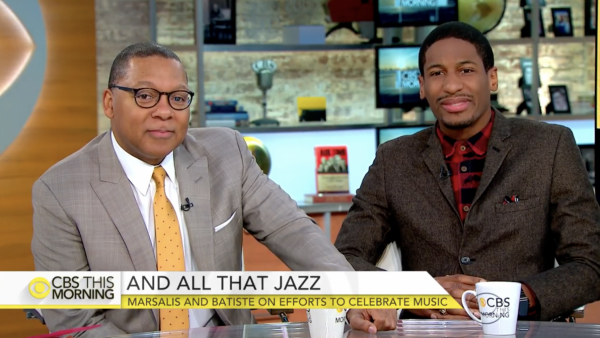 Videos
Videos
Wynton Marsalis and Jon Batiste on jazz composer John Lewis - CBS This Morning
-
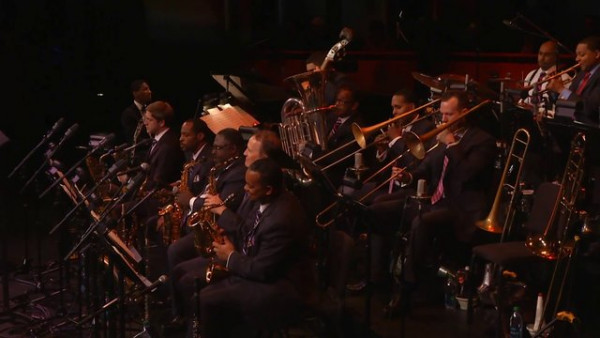 Videos
Videos
Spanish Steps (from The Comedy) - JLCO with Wynton Marsalis featuring Jon Batiste
-
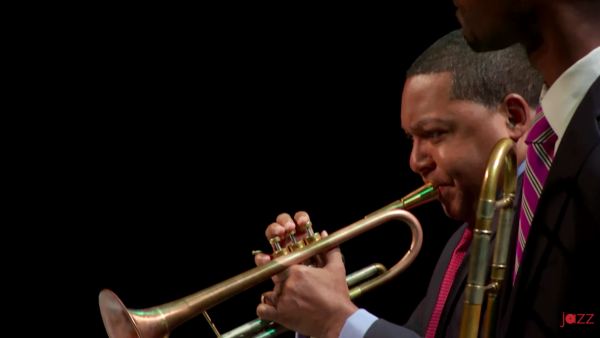 Videos
Videos
Delaunay’s Dilemma - JLCO with Wynton Marsalis featuring Jon Batiste
-
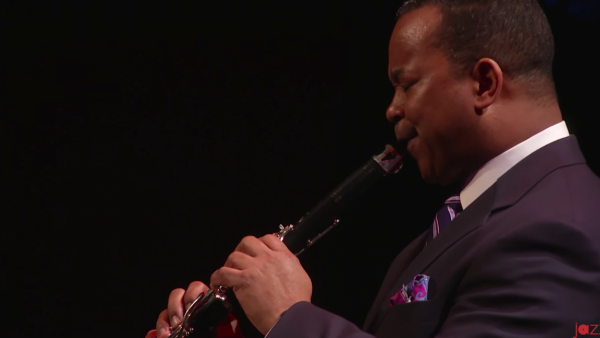 Videos
Videos
2 Degrees East, 3 Degrees West - JLCO with Wynton Marsalis featuring Jon Batiste
-
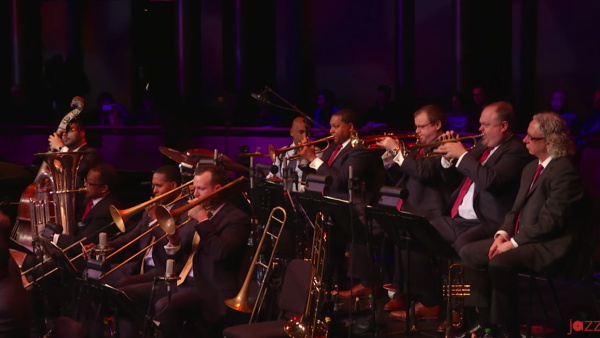 Videos
Videos
Pulcinella - JLCO with Wynton Marsalis featuring Jon Batiste
-
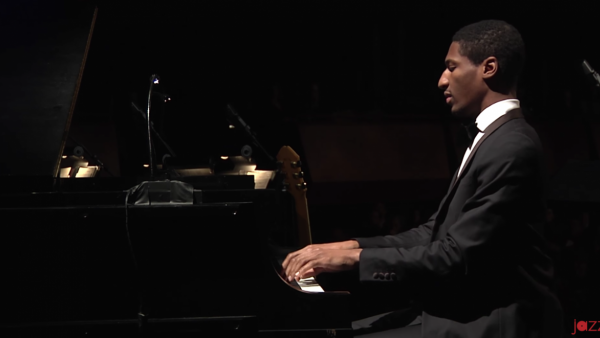 Videos
Videos
Django - JLCO with Wynton Marsalis featuring Jon Batiste
-
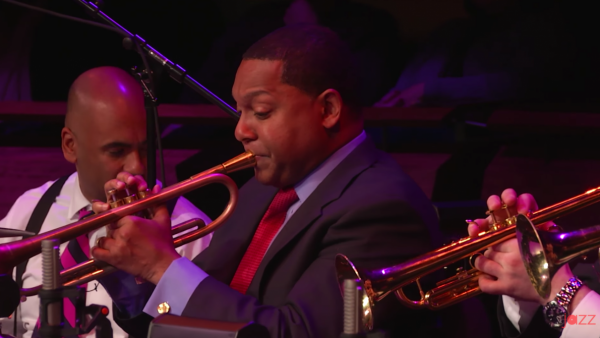 Videos
Videos
Piazza Navona - JLCO with Wynton Marsalis featuring Jon Batiste
-
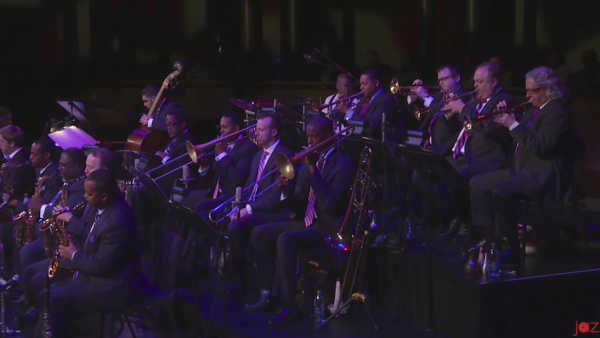 Videos
Videos
Two Bass Hit - Jazz at Lincoln Center Orchestra with Wynton Marsalis featuring Jon Batiste
